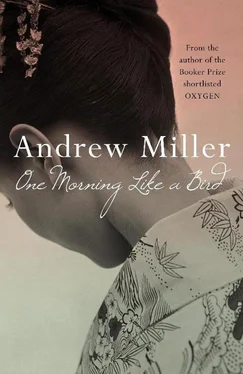Someone is calling him. He turns, scans, sees at last, in the light of a kite stall, the Miyazaki brothers, Taro and Junzo, waving to him. He waves back, pushes through to them. They exchange their New Year greetings, first in their own tongue, then, more quietly, as fellow members of the club, in French.
‘Your people here?’ asks Taro.
‘Somewhere,’ says Yuji.
‘Ours too,’ says Taro. ‘Somewhere.’
‘Have you noticed,’ says Junzo, leaning and speaking in a stage whisper, ‘how the priests all look a bit Chinese this year? And there’s a definite smell of garlic about the place. Shouldn’t we, as respectable citizens, report them to the Tokko ?’
Taro punches his brother’s shoulder. He’s grinning but there’s no amusement in his eyes. ‘Little brother’s had a few,’ he says.
Yuji nods, looks from one to the other — from Junzo, with his hair poking in tufts from under his student cap, a yellow scarf wound round his neck and trailing almost to the ground, to Taro, who, in his new hat, his new coat (a ministry pin on the lapel like a drop of spilt silver), is as neat as the menswear poster outside the Shirokiya department store. There’s a second of silence between them, then, as though to cover an unexpected awkwardness, they start, in hurried voices, to speak about the French Club’s year-forgetting party at the Feneons’, and laugh, all three genuinely amused this time, at the recollection of Junzo’s barking competition with Feneon’s pug, and how at the end of it, Alissa Feneon awarded Junzo the prize, a mock diploma torn from the back page of a newspaper, an advertisement — aimed, presumably, at the families of military men — for a kind of indestructable Rayon sock.
When the laughter stops, Yuji says, ‘I’ve had some bad news.’
‘Your father?’ begins Taro, cautiously.
‘No, no . .’
‘You mean,’ says Junzo, ‘someone’s given you a job?’
‘I mean I shall need to find one now.’
‘So, it’s the allowance,’ says Taro.
Yuji nods.
‘A cut?’
‘Worse.’
‘All of it?’
Yuji nods again, then finds, suddenly, he does not want to discuss the matter at all, that there’s a tightness in his throat, a bubble that threatens to swell into a sob. If he was to stand in front of the Miyazakis blubbing, the shame of it would burn for months . .
He is saved by drums, by lights. The priests and their assistants, illuminated by the brilliant-white cones of two searchlights, are processing up the steps of the hall of worship. Afterwards, the ‘Navy March’ is played through speakers slung from wires between the trees. The friends agree to meet at Watanabe’s bathhouse as soon as the holidays are over, then Yuji enters the crowd again, moves through its shifting labyrinth until Mrs Sakaguchi, mad for gossip about his embarrassing parents, tugs at his sleeve as he passes the purification trough. He backs away from her, apologising and bowing, then follows a side path out of the shrine precincts and onto the road to the cemetery.
He has given up the hunt for Kyoko (did he really expect to find her?) but is in no mood to be at home, sitting in the cold and perhaps having to listen to more reminiscences about the old days at Imperial. In a few minutes he is alone, walking through the lanes of a neighbourhood almost untouched by earthquake and fire — or as untouched as anywhere in this city of disasters. A secretive place where the mouth of an alley, a pair of wooden sandals propped on a verandah, the snow-covered slats of a dog-fence, float uncertainly in the light from tightly latticed windows. At night almost anyone can become lost in such a neighbourhood, but Yuji, preoccupied by an unhappiness almost indistinguishable from a certain type of boredom, navigates with an unconsidered sureness of step until a subtle chilling of the air warns him he is only a turn or two from the cemetery. He does not believe in ghosts and yet, somehow, this does not stop him from being afraid of them. He slows his pace, imagining them roused by drums and gongs, gathering at the cemetery gates (rustling together like the wings of insects) and waiting for some foolish young emissary of the living to pass close by.
And it is then, just as he is considering turning back towards the holiday crowds, that he sees two figures appear, palely, from the dark at the end of the street. He steps under the eaves of the nearest house, presses himself against the shutters, but already he can tell that the figures are men, not spirits, and pale only because, other than for loincloths and headbands, they are both naked. They are running, hopping over the snow, though their progress is pitifully slow. As they come closer, he hears their little yelps of pain and self-encouragement, and as they draw level with him, he sees how their skin glitters with ice like fish scales. Shrine runners. Middle-aged penitents hoping to earn a year of better luck by dousing themselves with buckets of bitter-cold water at every shrine they stagger into. Clenched teeth, clenched buttocks, they do not even glance at Yuji as they pass, though he is no longer hiding from them. If Junzo and Taro were with him, he might have found the scene absurd, would, perhaps, have slyly laughed, but on his own he simply watches them as they disappear into the bend of the street, stares after them, enviously, as if these men had found a form (forget how mad it looks) that answered whatever urgencies provoked them. If he was to strip now and bundle his clothes, would they object to him hopping over the snow at their backs? It would almost certainly kill him, but no one — not Father or even the old woman — would dare to call him frivolous. How amazed they would be to see him return to the shrine in nothing but his underwear! To hear him hollering to the kami as the well water broke over his head!
It’s two o’clock before he is in his own neighbourhood again, cold and hungry. He would like to warm himself with a bowl of steaming noodles, and wonders if Otaki, in festival humour, might still be open, but the shop is shut and shuttered, a tongue of snowless pavement outside where the dregs of the broth have been poured away. On the Kitamura Gate the flame is out. He watches a while, his ears stinging with the cold, then goes into his own house, slides the door and stands on the beaten earth of the vestibule listening for voices. A glow in the panel above the doors to Mother’s room is enough for him to see Father’s boots beside the vestibule step, and the shadow of Miyo asleep under her quilt on the mats at the bottom of the stairs, an arrow charm from the shrine next to her pillow.
He goes to the kitchen, eats a mouthful of congealing rice, washes it down with a cup of water. When he’s finished, he steps over Miyo and climbs towards his room. At the turn of the stairs, his toes touch the shaped hard edge of something, and though the turn is the darkest place he knows, as he reaches down, that it’s the old talisman of the seven gods that Mother leaves out — with her own hands or Haruyo’s — for him to slip beneath his bolster and so enter the New Year with propitious dreams of eagles, sacred mountains . .
He carries it to his room, pulls off his jacket and tie but nothing else, then gropes his way into the bedding, curls up and lies gazing at the blue snow-light in the glass of the drying-platform door. The shrine runners run through his head, feebly glittering figures always a step or two from disappearing into the night. In reverie they gain strange identities. Father and Dr Kushida. Junzo and Taro. Himself and Ryuichi. Himself and Saburo. Staggering over the snow, hopping over the snow . .
Then out of the small-hours hush he hears, faintly from some neighbouring house, the sound of piano music on a wireless. The Schumann piece, perhaps, everyone pretends to like so much. Then it ends, or the dial is turned, and something else begins, the simple notes of a koto playing a song he remembers from earliest boyhood, ‘The Boatman’s Song’, a sentimental, empty-headed little ditty, and to his own cold fingertips he starts to whisper the old words: ‘I am dead grass on the riverbank. You are dead grass too.’
Читать дальше












